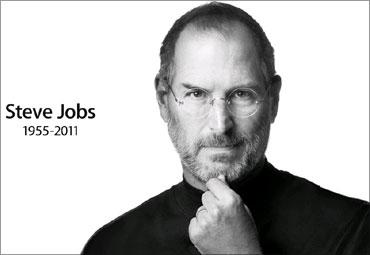 | « Back to article | Print this article |
Mr Jobs's place in management history is assured for being the model CEO who spent his waking hours obsessing about making their products 'insanely great', says Ajit Balakrishnan. While much of the world continues to lust for his creations, Steve Jobs, the founding visionary and CEO of Apple died on October 5th. He was just fifty six.
While much of the world continues to lust for his creations, Steve Jobs, the founding visionary and CEO of Apple died on October 5th. He was just fifty six.
A kaleidoscope of images flashed through my mind when I heard this. The TV ad film that launched the first Macintosh, the unveiling of the iPod in 2001 that inaugurated the era of gadgets connected to the internet, the 2007 launch of the iPhone instantly obsoleting all other mobile phones, most of all, Steve's moving speech at Stanford in 2005.
'My biological mother was a young, unwed college graduate student, and she decided to put me up for adoption,' he had said describing the painful situation of his birth. His biological parents were Abdulfattah Jandali, a Syrian and Joanne Simpson Schieble an American, who met as graduate students.
The declaration of the arrival of the Information Age for many of us was the Macintosh computer and the TV commercial that launched it. The commercial worked subtly off George Orwell's novel, 1984. It opened in a dark blue and grey industrial setting with a line of workers marching lock-step through a long tunnel. A nameless heroine appears carrying a large hammer, being chased by security guards in black uniforms. The heroine races towards a large screen with an image of a Big Brother-like figure, hurls the hammer at it and the screen is destroyed in a flurry of light and smoke. The Macintosh would liberate the world from the tyrannical and centralized world that George Orwell had prophesized.
Steve's resignation -- and now death -- has prompted many eulogies with many aptly calling him America's greatest industrialist ranked right up there with the likes of Henry Ford and Carnegie. But many also made references to his 'micro-managing'. These are the reports that make me sad.
I believe what Steve will be remembered for most is for his alleged micro-managing. It showed that he was the first 'auteur' CEO of a major company. The term auteur, French for 'author', is from film theory and it holds that a film reflects its director's personal creative vision. In the early days of film, the making of a film was seen as an industrial process. Then, directors like Alfred Hitchcock with Psycho, The Birds and Rear Window, and Ingmar Bergman with Wild Strawberries, with their distinctive, recognizable style lifted film from its base industrial level.
In the world of management, the CEO is seen by many to be the manager of administrative processes. This misunderstanding can be traced back to Alfred Sloan and his famous memoir, My Years with General Motors. Sloan idealized the CEO as a rational, shrewd plutocrat managing a firm with detachment. Much of management theory, keeping industrial era firms in focus, has been built on this. The CEO, in this vision, is seen to be the man on top of the pile, the unemotional head of a command and control hierarchy. Even the one emotion that was allowed to him, a messianic belief in the gospel of Shareholder Value Maximization, has been denied him now that Jack Welch, the legendary former CEO of GE has dismissed that 'the dumbest idea in the world.'
Steve's place in management history is assured for being the role model CEO who spent most of his waking hours obsessing about making their products 'insanely great'.
His auteur touch was evident when the iPhone debuted in 2007. The mobile phone industry was dumbfounded. The keyboard, once seen to be as integral to a mobile phone as four tires were to a car, had disappeared. In its stead was a software keyboard animated by touch. The rest of the industry has spent the next four years trying to catch up with this.
A new reality had appeared. Even for physical products the software platform it is built on and its aesthetic usability was the source of competitive advantage. The manufacturing of the physical part of the product contributes so little to the competitive advantage that it is outsourced to low cost producers.
And the auteur CEO Steve Jobs, just as those other 'micro-managers' Hitchcock and Bergman had done for film, had lifted the modern firm out of the Industrial Age and brought it into the Information Age.
Comments to ajitb@rediffmail.com